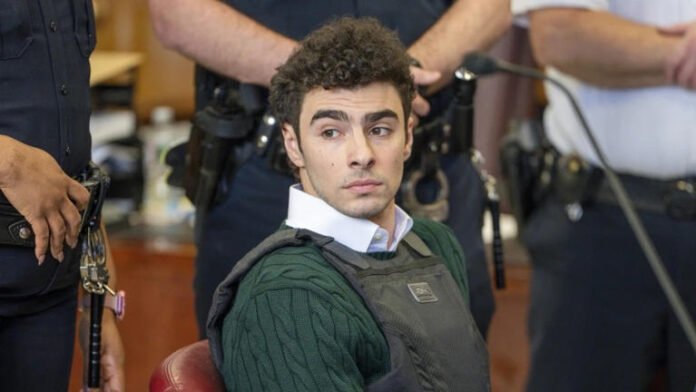Luigi Mangione, a man already known to law enforcement, has been indicted for the brutal murder of UnitedHealthcare CEO, Michelle Williams. The crime, which took place last month, has sent shockwaves through the corporate world, with many grappling to understand the motive behind the violence that claimed the life of one of the country’s most influential healthcare leaders. The indictment, filed by the prosecution this week, carries with it an extreme charge: the seeking of the death penalty.
Michelle Williams, 52, was found dead in her luxury home in Minnesota, in what investigators initially believed to be a botched robbery. However, as the investigation progressed, authorities uncovered evidence that painted a more chilling picture: the murder appeared premeditated, with Williams specifically targeted. Following extensive interviews and surveillance, Mangione was arrested and charged with her murder.
The Details of the Crime
The murder of Michelle Williams was a crime of shocking brutality. Williams, known for her visionary leadership at UnitedHealthcare, was discovered by her housekeeper on the morning of the attack. Initial reports suggested that there had been no forced entry into her home, raising suspicions that the killer may have been familiar to her. Investigators later revealed that the killing was carried out with a weapon of opportunity—likely something Mangione had access to during the confrontation.
Sources close to the investigation say that Williams had received a number of threats in the weeks leading up to her death, though the nature and origin of these threats remain under investigation. It is still unclear whether Mangione, who had no known direct relationship with Williams, acted alone or whether he was part of a larger conspiracy. What is certain, however, is that the crime was meticulously planned, with investigators finding that Mangione had researched Williams’ schedule in the days prior to the murder.
The Arrest of Luigi Mangione
Luigi Mangione, a 45-year-old former employee of a tech firm, was arrested after a series of surveillance camera footage and phone records connected him to the crime scene. Authorities traced his movements from the vicinity of Williams’ home on the night of the murder, and subsequent forensic evidence confirmed his involvement. Mangione, who had a prior criminal record, had been known to harbor grievances about corporate executives, though no direct link between him and Williams had been established before the crime.
Mangione’s arrest was met with disbelief by many who had known him in his previous professional life. Colleagues described him as a quiet, somewhat reserved individual with little to no history of violent behavior. However, those close to him have since speculated that personal frustrations, possibly related to financial issues or feelings of injustice, may have played a role in his decision to target Williams. Investigators have not ruled out the possibility of a broader motive connected to the corporate world, given Mangione’s previous employment history.
Prosecutors Seek Death Penalty
Following Mangione’s indictment, the prosecution filed formal charges, including first-degree murder, with the added request for the death penalty. This decision comes after careful consideration of the severity and circumstances surrounding the crime. Prosecutors argue that the murder was premeditated and particularly heinous, pointing to the violent nature of the attack and Mangione’s calculated planning.
“The murder of Michelle Williams was not an impulsive act. It was a deliberate and calculated crime, carried out with the intent to take the life of an innocent woman who had no known ties to the defendant,” said District Attorney Rachel Bennett, speaking to the press following the indictment. “We believe that the circumstances of this case meet the criteria for the death penalty, and we will pursue justice to the fullest extent of the law.”
The death penalty request has sparked a significant debate among the public, with many questioning the appropriateness of capital punishment in such cases. While some support the idea of a death sentence for Mangione, citing the brutal nature of the crime, others argue that the justice system should focus on rehabilitation and the possibility of reform, even for individuals who have committed violent acts.
The Impact on UnitedHealthcare
The murder of Michelle Williams has sent ripples through the healthcare industry, with UnitedHealthcare’s board of directors, employees, and clients all in mourning. Williams had been at the helm of the company for over a decade, leading it through some of its most challenging years and playing a pivotal role in expanding its reach across the country. Her leadership was widely respected, and she had become a symbol of corporate success and resilience.
In the wake of her death, UnitedHealthcare has expressed its grief and vowed to continue her mission, though the loss has undoubtedly left a void in the company’s leadership. In a statement issued shortly after her passing, UnitedHealthcare promised to honor Williams’ legacy by continuing the initiatives she had championed, particularly in the realm of healthcare accessibility and affordability.
As the case against Luigi Mangione moves forward, the spotlight will undoubtedly continue to shine on the tragic murder of Michelle Williams, a leader whose life was taken too soon. The request for the death penalty in this case reflects the severity of the crime and the deep impact it has had on both the personal and professional spheres of those who knew Williams. While Mangione remains in custody awaiting trial, the investigation into the full extent of the crime continues, with authorities exploring any potential connections that may further explain the motive behind this heinous act.

